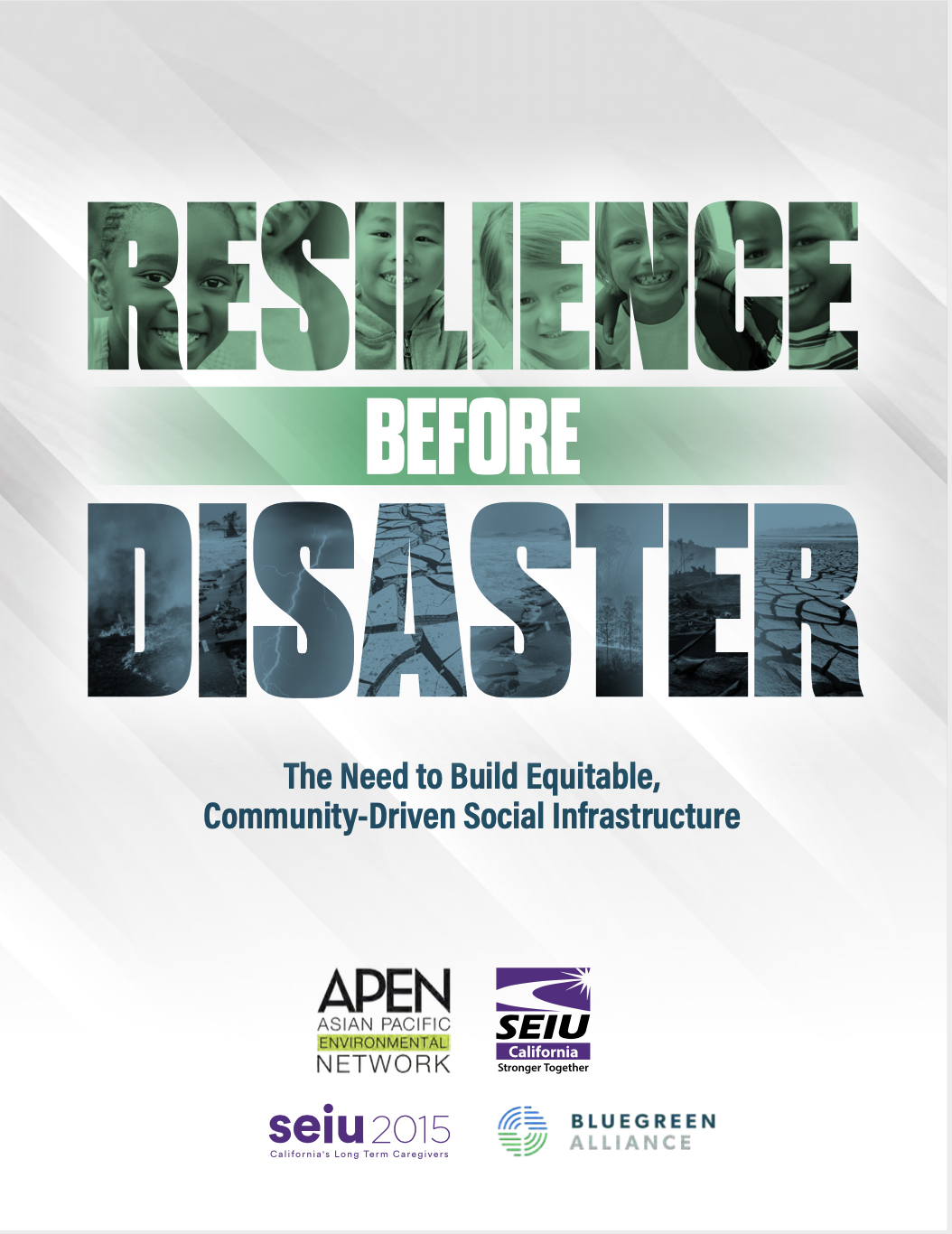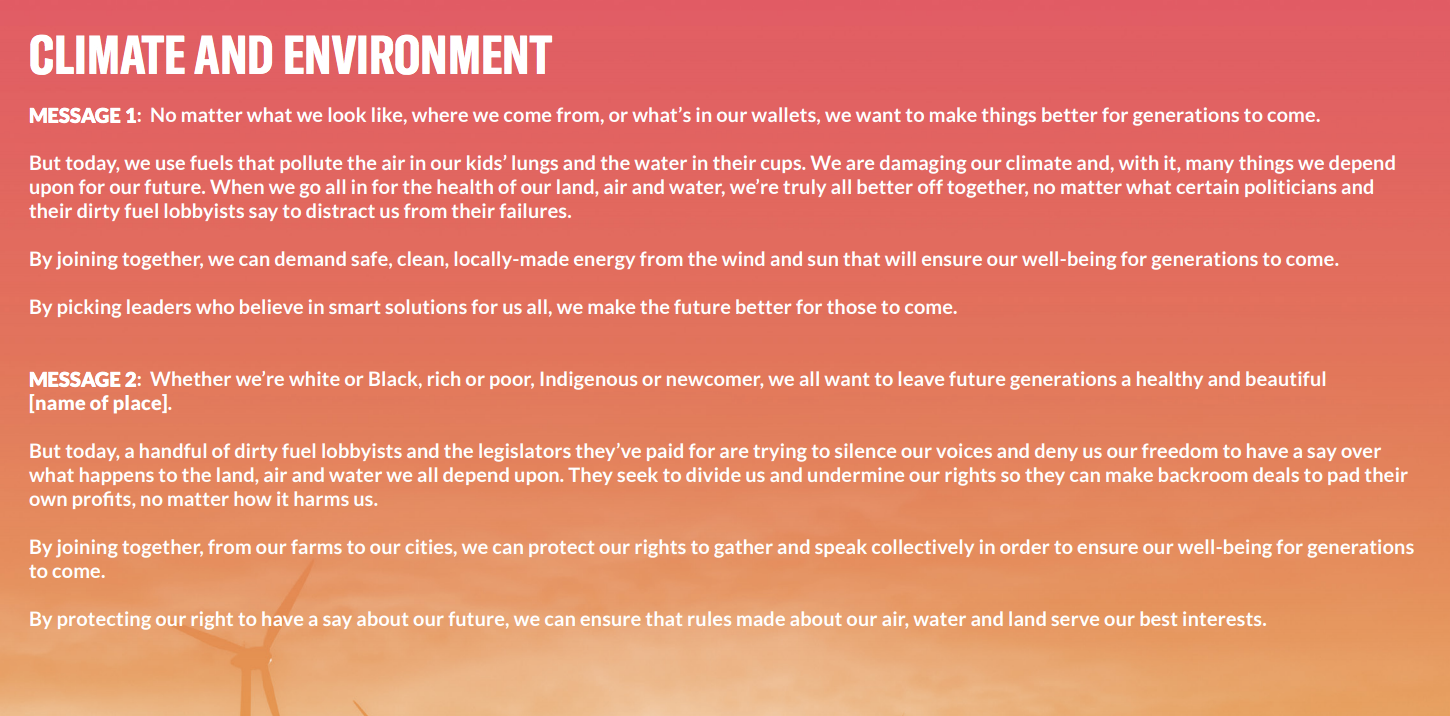Resources
Search below for resources covering the intersection of climate engagement, social science and data analytics.
RESULTS
Why Intersectional Stories Are Key to Helping the Communities We Serve
Many people communicating for social change are exploring how to tell diverse and inclusive stories that center marginalized communities while building understanding about how inequality persists. Intersectionality is an important tool to help us tell great stories that help us understand systemic issues. Five guiding principles to telling intersectional stories: Show, don’t tell; Provide historical context; Uplift the voices of marginalized people; Tell whole stories; and, Radically reimagine the world.
The One-on-One
There are six key steps to executing the best “one-on-one” conversation—specific to a union organizing setting, but potentially applicable to other settings. Step One: Discover the issues—ask open-ended questions to understand the problems the worker cares most about. Step Two: Agitate—ask provocative questions about the frustrations expressed by the worker. Step Three: Elucidate—provide your worker with alternatives, such as enhancing worker power with a union. Step Four: Make an “ask”—before assuming you will be rejected, ask the worker to take a concrete action. Step Five: Innoculate—prepare the worker for the toxic arguments that the boss will give in fighting union power. Step Six: Follow up—check in after the conversation to try to ensure consistent communication and action.
Strategy and Execution of the Fight for $15 Minimum Wage
This series chronicles the Fight for 15 organizing campaigns in various U.S. cities and states over the past few decades. Examples include Detroit, Chicago, and Seattle. Various articles and interviews—written by different authors—describe the history of organizing efforts, policy goals, and organizing strategies behind both victories and losses. Multiple articles focus on the successful Florida 2020 minimum wage ballot question campaign—particularly the role of workers on the campaign, digital and communications GOTV tactics, and what overall lessons leftists and progressives can take away.
- A broad majority (69%) of New Yorkers support levying a tax on corporate polluters, where the revenue (estimated $15 billion raised per year) would be used to invest in new renewable energy projects, community sustainability initiatives, and fossil fuel workers impacted by the transition to clean energy.
- Support for specific investments is also high:
- 65% support investing funds in large-scale renewable energy projects, like offshore wind farms and mass transit overhauls
- 63% support investing in low-income communities and communities of color to improve their climate resiliency and sustainability
- 73% support investing in programs for workers and communities impacted by the transition away from coal, oil, and gas
Resilience Before Disaster Interactive Webinar
This interactive webinar covered the process of how this collaboration between environmental justice and labor forces was facilitated, how they built a shared vision around resilience, a rundown of the report's key findings, and a guided activity for how to apply the report's insights to participants' local communities and organizing work.
Resilience Before Disaster: The Need to Build Equitable, Community-Driven Social Infrastructure
California and the US are increasingly beset by climate-fueled disasters like wildfires, extreme heat, and power blackouts. These events put additional stress on frayed hard and social infrastructure systems, and disproportionately impact working-class communities of color. To adapt to these changes, society must update our notion of disaster response to increase resilience in these systems before disasters strike. This report offers two models for this response: 1) building and normalizing resilience hubs where community members gather and organize both in good times and bad, and 2) increasing in-home resilience by recognizing homecare workers as effective agents for assisting vulnerable populations and bridging authorities and the frontlines. The report goes on to recommend specific ways to set up resilience hubs, train care workers, and develop forward-thinking emergency response plans to avert human disasters after natural disasters.
Poll: Pennsylvania voters support participation in climate pact
A statewide poll of Pennsylvania voters found that...
- 72% support the state participating in the Regional Greenhouse Gas Initative (RGGI) and 56% said they were more likely to vote for state elected officials who support joining RGGI
- 56% said the initiative would boost the state’s economy, while 21% said it would hurt. Forty percent believed it would have a positive impact on their electricity bill
- 70% said they would be more likely to support RGGI if proceeds were invested in training workers for clean energy jobs, expanding energy efficiency programs for homes and businesses to lower consumer bills and boosting economic development in farming communities that produce renewable energy
- 78% percent want the state to provide job training, guaranteed wages or other assistance to coal and natural gas workers who lose their jobs as a result of the market transition to renewable energy sources
- 76% of respondents considered climate change to be a serious problem, with nearly half of voters saying it is “very serious”
- More than 70% also supported the state updating and strengthening regulations to restrict the release of methane from natural gas wells, pipelines and storage facilities
We Make The Future Messaging Guide
The We Make the Future Messaging Guide is for campaigners, researchers, and all people who want to persuade others to take action to confront the challenges of a changing climate. The guide is based on rigorous research into perception and persuasion, and provide specific recommendations to engage base constituencies and persuade the middle (or people who haven't spent a lot of time thinking about specific solutions). The core of this work is the Race Class Narrative, an approach that weaves together economic empowerment, racial justice, climate justice, and gender equity, using language proven to work to mobilize and persuade people to take action.
This is a how-to guide. It provides guidance on:
- What to say and, crucially, what not to say
- How to weave together the rights words and the right narrative
- How to link related issues such as racial justice and climate justice within all your communications and calls-to-action
- Specific ways to use these messages on email, social media, and via text message
Pagination
- Previous page
- Page 2


